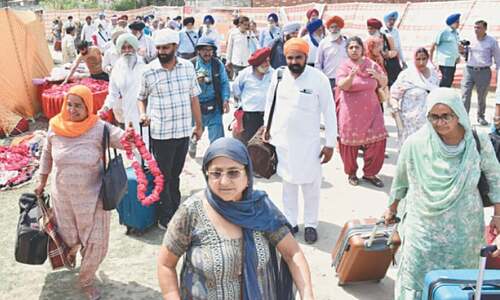LAHORE: The Punjab government has decided to promote oil seeds cultivation in the province by offering subsidy to farmers in a bid to cut the country’s edible oil import bill, and improve their incomes by encouraging cultivation of non-conventional crops.
Foreign currency-starved Pakistan had imported edible oil, mostly palm oil, worth US$4.5 billion in 2022.
As per the decision, the provincial agriculture department will offer Rs5,000 per acre subsidy for total 100,000 acres to be brought under canola hybrid (imported) variety cultivation this Rabi season, sowing for which will begin within days.
A farmer may claim the subsidy for a maximum of five acres, it was decided.
To promote good agricultural practices in oil seed cultivation, the department will also set up 200 demonstration plots in the districts where canola is mostly sown, and the government will offer Rs20,000 per acre to the farmers interested in setting up a model plot and to be selected for the purpose through balloting.
The agriculture authorities are also encouraging inter-cropping of canola with other Rabi crops, including wheat, sugarcane and berseem (a fodder) and offering Rs5,000 per acre subsidy on it. At least 10,000 seed kits will be distributed among the farmers under the scheme, requiring them to cultivate one row of canola after each 8-10 rows of wheat and berseem, and on crests of fields of sugarcane sown in September.
Dr Ishtiaq Hassan, Director General (extension), says the step will serve two purposes; improve the farmer’s economy through availability of home-grown edible oil, and act as a biological measure against aphid pest attack, particularly on wheat, during the hot and humid weather when the crop is mature but not ripe.
He explains that a different species of aphid does attack canola too, but it is prior to the attack on wheat that leads to the creation of ladybird beetle, which eats up to 1000-2000 aphids per day without vegetation.
He says that apart from inter-cropping, the farmers will also be given 20,000 seed kits, each worth Rs300, for sowing canola at least on one kanal of land and winter season vegetables’ seeds for 10 marla land to reintroduce kitchen gardening among the rural population.
He says that as for farmers’ complaint about the past interventions for promoting oil seed cultivation that they could not find buyers for their crop because of a lack of oil extraction machinery in and around their settlements, the department has decided to give 50 percent subsidy on at least 100 small oil extracting units in villages. A sum of Rs600,000 will be offered for installing each oil extraction unit, the DG adds.
Dr Hassan says that as an added incentive, a prize of Rs500,000 will be given to the grower getting the best per acre yield in the province, whereas at district level prizes will be given to first, second and third position-holders worth Rs300,000, Rs200,000 and Rs100,000, respectively.
Published in Dawn, October 2nd, 2023














































